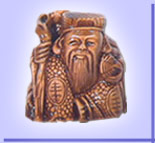Who is the seeker?
Sudak, June, 22, 2004
Sumiran: The second aspect of our morning talk is the seeker. In the
afternoon I suggested you to think about, to look at it. Now I’d like
to listen to your observations. Let’s do it together, someone going
to figure out one aspect, someone – another one, and then we’ll put
it in one scheme. So, in what way do we define ourselves?
Seeker 1: As the body, there is the knowledge of oneself as the body.
Seeker 2: I am that which wants to love all people, however some tragedy
happens – you want to love all people, but you don’t manage to, your
offences, anger, envy hinder this. There is a state of despair because
of this.
S.: So you say that there is a wish to love, but something hinders.
Nevertheless you first define yourself, and the wish to love and some
hindrances come only after. Now we are trying to clarify the question
– how do we define ourselves? How do we know ourselves? And the first,
as Larisa said, is that we know ourselves as the body. The body places
us into space, if we are speaking about space and time, gives us some
feeling of being figured out in space. We perceive lots of objects,
and the body as well. It is in the sphere of our perception. Not always,
by the way, we don’t feel the body when we sleep, but when we wake up,
we immediately perceive lots of objects. At the moment of awakening
we start perceiving our body as well. And we connect ourselves with
one of the perceived objects – with our body. Look, there is an interesting
moment – when we wake up, we at once perceive the whole world, the whole
space, and the body is one of the objects of this world. But then, with
the help of a thought we connect ourselves with the body - I am exactly
this object. The mind brings in the idea that among all the objects
appeared in the moment of awakening, Me is exactly this object. This
puts us into space, we get into space through the body, we get connection
with space. So, in the present moment we know ourselves as the body.
As what else do we know ourselves? What else are we?
Seeker: Thoughts, any thoughts.
S.: No, not any. Let’s take thoughts about the sea. Thoughts about
the sea are not you, aren’t they? When speaking about a thought, what
is you? You may think about the sea, and you may think about yourself.
What is the difference? Both is thinking. What are the thoughts about
you? What kind of thoughts are they?
Seeker.: Thoughts about myself as the body. One may think about his
or her qualities…
S.: Qualities, which ones? Status. Look, we know ourselves as some
feelings, ideas about ourselves. What does appear, when we think about
ourselves?
Seeker.: I am a woman, I am that and that old, my name is so and so.
S.: When we think about ourselves, we do this in the context of that
we were born, we were children, we have past and future. That is, if
following this line, we know ourselves as some beings who live in time.
But how do we know this, using what? Using the memory. Memory helps
us and creates time for us. Here is an interesting moment, have a look
– an ordinary person perceives time as an objective process which exists
indeed. But if looking at this more attentively, time is simply a form
of the movement of thought. If we don’t think, we don’t have past. In
order to feel ourselves a person living in time memory is needed. If
there is no memory, we aren’t able to feel ourselves lengthy. How do
we feel that we live? Not just exist in the present moment, but live.
We remember who we were some time ago, compare with what we are now,
and there appears a feeling that there is time, some length. For this
memory is needed, two thoughts are to be compared. Therefore the second,
we know ourselves through the memory. Memories, thoughts about our past.
Then we know ourselves as an idea about who we are in the present –
our qualities, etc. These are simply some images. First, we are connected
with the body by the thought “I am the body” and we are bound with the
ideas about ourselves “Who I am”. These are simply some ideas. So, there
are these two things – the body and an image of ourselves. What else
does exist in us as Me?
Seeker: The soul!
S.: The soul, where is it? Show me. I see the body, the ideas about
oneself, too. And who is going to show the soul?
Seeker: This is a very materialistic approach
S.: What does it mean, materialistic approach, I want to look at it,
I am not telling it does not exist.
Seeker: The soul is our thoughts, emotions, anger, jealousy. Internal
feelings…
S.: The body for us is very much real, ideas about ourselves “who
I am” are quite real as well. What else is quite real in the knowledge
about oneself or in experiencing? Emotions. Feelings. The “I am” feeling
asserts itself, one cannot say that I am not, because the statement
that I am not itself implies that there is someone who states this.
To state one’s own absence is simply impossible. So, if we take a human
being, we very clearly see these three phenomena – the body, ideas about
oneself, self-consciousness (I exist). We can add subtler moments here
– emotions and thoughts. We can determine ourselves through emotions
and thoughts. Next, why did I decide to speak about this? When people
say that a man is moving towards God, which of the parts among these
does reach it? Assume we take the body, does it reach God?
Seeker: It seems to me it doesn’t.
S.: If we are speaking about the body, we see that it is found in
space. The God is reached not by the body, moreover, we have already
spoken that God is not an object in space. The body can reach some object
in space, but if God is not an object, then the body cannot reach it.
That is why much is simplified then – everything connected with the
body, it’s movement in space or putting it into various positions is
not a way to God. Then look, the body connects us with space, the idea
about ourselves connects us with time. In order to have an idea about
oneself one needs to have memory, knowledge. There cannot be any ideas
about oneself without memory, that is, we accumulate certain information,
then using this information create the knowledge who we are. Accumulation
of information means time. That is the idea about oneself, the image
of oneself may exist only in time. If we exclude memory, then we cannot
create the image of ourselves. No past – no image. We are simply present.
That is why the image of ourselves is something that helps us to exist
in time. That is we have a yesterday image of ourselves, a 5 ,10 years
ago image of ourselves. There is an image of us in the future. This
is being created with the help of the memory. The image of oneself is
something that is moving in time. The body is what is in space, and
the image of us is what is moving in time. The image of oneself is a
thought, and how the thought can reach reality? It is important to understand
this! Idea cannot reach God, that is the idea about oneself, the image
who I am. Then who does reach? Who is moving to God then? The body doesn’t
move. The image, ideas about oneself are simply knowledge, simply thoughts,
a set of memories, they also don’t reach God. Then we say that maybe
the soul is moving towards God? But the soul is a very ephemeral thing.
There is also an I am-feeling.
Seeker 1: It seems to me that some people feel the soul as an energetic
substance, some people don’t. It is something that exists for several
lives. In spite of the limitations it is also to be found in some religions
as something aspiring to God. A lot is happening around this.
Seeker 2: Does it have anything different from the physical body?
Seeker 1: It has something different for sure, while being limited
in time and space…
Seeker 3: The aura around the physical body does exist indeed, why,
the soul does exist, too, although we don’t see it. We also don’t see
the aura, but there are people who see…
Seeker 4: It cannot be seen, but felt, however how is this happening?
S.: Look, when we feel something there are certain characteristics.
We can describe the physical body, emotions – there is aggression, there
is joy. We can speak about a thought, there is the process of thinking.
Hence, if we are speaking about the soul, then we have to feel the characteristics
attributed to the soul.
Seeker 3: Maybe, movement.
S.: Movement is inherent to any type of matter – the body is moving
and emotions as well.
Seeker 3: Well, the guardian angel is our soul. I understood this
not long time ago.
Seeker 4: And the soul has it’s movements; there is a saying “beautiful
movements of the soul”…
S.: Which are they, and why aren’t they restricted by the movements
of emotions? What is inherent to the movements of the soul? How do we
understand that this is the movement of the soul, and, say, not of the
body?
Seeker 4: Perhaps there are some high experiences.
Seeker 2: High means rare, hmm?
Seeker 4: Someone has them rarely someone not.
Seeker 1: It can be also defined using the method of negation. There
are some feelings that are not inherent to the body, not inherent to
the memory, that aren’t inherent to the “I am” state. And there is the
forth thing that exists. One may say essence, or energy structures.
S.: Ok, we have certain structures that have some movements. By the
way, in the morning we defined them as feelings that arise and go.
Seeker 5: So, does it mean that if they sometimes are, sometimes aren’t,
it is the same with the soul?
S.: It is an open question.
Seeker 1: So, there comes out, that if you lose the feeling of the
body during meditation, then the body doesn’t exist at all? Or you don’t
feel the body during sleep, but this doesn’t mean that it doesn’t exist.
The same with the soul, if you don’t feel these movements, it doesn’t
mean that there is no soul. It is simply not manifested at these moments.
One should investigate this.
S.: If you don’t feel the body this doesn’t mean that it doesn’t exist,
but this doesn’t mean that it does exist also! This is an open question.
When the body is not being registered we cannot say whether it exists
or not, we may only say that there is the absence of registration.
Seeker 5: And who does register it?
S.: Who does register the body? The senses are the body themselves.
The senses and the body are one. Look, a very interesting phenomenon
when speaking about the registration of the body – there is a state
possible when we think, but don’t feel the sleep. In this respect we
may say that there is a possibility to think without feeling the body,
vice versa is not possible. What does the registration of that I have
the body mean – this is a thought. It is important to understand this.
Notably, the signals from the body come to the brain cortex and then
further, with the help of thinking we register the fact that the signals
have come.
As the mystics say, the body is reflected in the mind. And what is the
mind reflected in? Here is also an interesting moment – we think only
when we are conscious. When there is consciousness, the process of being
conscious of the thought is possible. When we are in deep sleep or without
consciousness, we don’t register the process of being conscious of the
thought. In order to be consciousness is needed. Consciousness is primary
– the mind is reflected in consciousness, the body is reflected in the
mind. There is one more interesting moment then – if moving backwards,
the Universe is reflected in the body, because if there is no body,
there is no Universe. Because in order to perceive the Universe it is
necessary to have an instrument of perception – and this is our body.
And look, what an interesting situation occurs – we consider that there
is the Universe, and the body appears in It. In reality the body appears
and the Universe is reflected in it. That is the body is necessary,
there cannot exist perception without the body. That is why the Universe
is reflected in the body, the body is reflected in the mind, and the
mind is reflected in consciousness.
People have introduced the concept of achievement of God. They started
to seek God, and after certain attempts they saw that God is impossible
to reach through the body. He is not possible to be reached through
the thought. And then, possibly the conception of the soul was introduced
– that there is something that reaches God. It is simply a kind of buffer,
an idea. If there is no soul, and I have got evidence that the body
doesn’t reach God, the thought doesn’t reach God, then everything looks
very hopelessly, and I have no chances. Then I simply introduce a concept
that there is something that can reach God and I call it a soul. It
is one of the variants. What is a soul? It is simply an idea, one more
thought – I have a soul. One more conception about myself – “I am a
being that has got a soul”. And moreover, I can confirm this; I can
experience subtler feelings and tell that this is the soul that can
reach God. I feel some movements, some subtle experiences and consider
that this is a part of me that can reach God. But why do you consider
like this? Why, can this part reach God? The body cannot, the thought
cannot, and this part of me can. Why is it so privileged? Try to give
me an answer to this question. What is the privilege of the soul in
relation to the body, the thought, emotion?
Seeker 3: There is an aura around the physical body, and when a person
leaves life, where does this energy field go to?
S.: Yes, I’d like to know where it goes to. That is we don’t know,
do we? We’d like to think that it goes directly to God. We don’t know
– this is a good stand. When there is no body, is there an aura? Those
who see the aura around the body, do they see it without the body?
Seeker 3: I haven’t seen this, but I know that some people see the
aura.
S.: If the body is dead, what does happen to the aura then? Those
people who see the aura around the body, do they write anything about
this? Aura without a body is called a ghost among common people. Aura
around the body is the soul and aura without the body is a ghost.
We are going to speak about what happens to what is called subtle body
or aura a little bit later. Now let us turn to what we know not from
a second hand account, but from our own experience. We know the physical
body from our own experience.
Seeker 6: From our personal experience we know that it has some experiences
of oneself or some of it’s states – I feel good, I feel bad, I feel
painful, I feel irritation, I envy – all these states or complexes of
these experiences is what is typical for the physical body.
S.: You separate yourself from the experiences. You say “I experience”,
you don’t say that “I am” these experiences. What is “I experience”?
Who does experience? Look, from moment to moment we may take a range
of experiences and collect a certain image in the memory, and this is
me. This is one of the ways. Another way is when there are experiences,
but I don’t say that this is me. I say that I experience. When I say
“I” what is there behind this? Behind this I?
Seeker: One cannot experience, if there is no memory.
S: It may not be true.
Seeker 3: Why? If a man loses one’s memory, one cannot orientate oneself
in the space where he or she is. He has got only physiology operating:
to eat, to sleep…
S: And physiology is perception.
Seeker 3: But if there is no memory, there is no orientation.
S: This is one of the ways to orientate oneself in space – through
the memory. But memory isn’t perception, memory is the way of processing
of perception. I get a signal, then I compare it with my experience
and take a decision.
Seeker 6: Besides the experiences that are linked to my body and my
emotions, I know some states when I didn’t feel myself in any way. I
was a kind of popping out of this… of the usual feelings, states. I
knew that I was present somewhere, but I couldn’t put it into words.
As soon as I don’t know something, I just can’t find words to describe
it. Let’s take the state of meditation – when I get into certain states
where I don’t feel myself one and the same with the body and my feelings
and emotions. I don’t know if the memory is gone. No, if the memory
were completely gone it would have been difficult to follow what was
happening to me.
S: Recognition happens. What is characteristic both for the ordinary
states in usual life and for that states? What is common? There is someone
who registers them. There is one part in you that registered those states
and these states, some part that was present both in that states and
these, because it can compare them.
Seeker 6: Yes, ones I can describe, those well known to me, and others
not. They are not subject to any of my definitions.
S: Look, when we come across some experiences then with the help of
the memory we recognize them. When a child is small, it doesn’t recognize
these states; first he should be given their names – this is joy, and
these are tears. These are just energy states for him that are not possible
to describe unless he is given a certain vocabulary. People are living
in a certain range of reality. When a man transcends this range, he
doesn’t have symbols for the experience. And we say “I am feeling some
energy”. Why do I say “energy”? Because there are no symbols. As the
practices that we start doing are not practiced among the masses we
are facing something that doesn’t have analogues in our name files,
that’s it. There is not much difference, we recognize some experiences,
because we were given verbal analogues in childhood, and some experiences
we don’t recognize, because we weren’t given the analogues. Experiences
start and end and we go on. Who is going on then?
S 3: The body.
S: The body is a chain of experiences. Body is changing – when we
were 4 we were different. Why do we call ourselves the body that used
to be 20 years ago, if everything is different now?
S 3: After half a year the body remained the same.
S: The body is changing from moment to moment. Everything is changing
inside of us even during 24 hours – the feeling of hunger, there can
be stomachache, emotions change, movements of the soul come and go,
and nevertheless we define ourselves as something that has some length,
some permanency. So what is it?
S 5: The “I am” feeling is constant. At 5 and at 20 years you have
permanently been feeling that you are.
S: The “I am” feeling is common. In all these states there is a feeling
that I am present at all this.
Then we say that something inside of us can find God. Which part? Does
the body need God? The body needs to eat, to sleep, to make sex. An
animal doesn’t seek God, although they have got the body as well. That
is the body has its interests which it fulfills.
The body doesn’t need God, moreover we lose it earlier or later. Then,
ideas about oneself, thoughts about oneself. We have an idea who we
are. In the same way we can create an idea about God. But an idea reaches
only an idea, if we have an idea of ourselves, idea can only reach an
idea of God, and not God Itself. The “I am” feeling is present in the
context of the whole our life. By the way, pay attention, this “I am”
feeling, is it changing or not? Emotions are changing, the body is changing.
The feeling of being present – observe it. The feeling of presence,
is it something that is subject to change or presence is presence? Just
observe this. You exist.
S 6: In order to observe one should live through each moment. Or from
time to time at least. Even during the day it will be tiring. Now I
have sat down like this, I have moved there or I…
S: This is a function, And the fact of “I am” is not a function. It
is important here to make a distinction. “I am” is a fact, and what
I do or “who I am” is relative, I define myself as a set of characteristics.
This set changes after some time. That is “who I am” is a relative characteristic,
it is changing with time, and “I am” is not changing with time. That
is the “I am” feeling is a basis, on its background there happen the
changes of the ideas about ourselves and our states.
S 5: But there is no such a feeling in one’s sleep… this “I am” feeling.
Where am I in sleep?
S: The first is that in a sleep you are aware that you exist, because
you observe the dream. There is no such clarity as in the state of awakening,
but in order to register one should be. You can’t not be and register.
The fact that you watch a dream means that first you are present in
order to watch. Now, the state of deep sleep, when we don’t see anything…
In order to know if you were 15 years ago or not, what do you use? Memory,
thoughts. That is 15 years ago you were a child, you felt something,
it was written down into memory, because in the moment when you were
living your memory functioned. And it registered what you felt. When
you are sleeping in a deep sleep, memory is absent, there is no thinking,
no images. And now you are trying to remember.
To remember – what does it mean? To use the thought to know what happened
to you in deep sleep. But the thought cannot touch that state, the thoughts
are absent there. The “I am” feeling hasn’t got any memory, it is unique
by this fact. This is the personality that has got the memory, that
is why the “I am” feeling cannot say “I am”. That is from the “I am”
point of view the question is nonsense. The question is posed by the
mind. And obviously there was no mind there. The “I am” feeling doesn’t
ask such questions. It simply defines itself in each moment of time
as presence.
So, coming back again, who is the seeker? Who is searching God indeed?
The body is not searching. It happens sometimes that the mind starts
searching God. We create an idea of God. We have created an idea of
ourselves. And we have created an idea of God. But what is there that
the mind can find? Is it possible for the mind to find God? What does
it mean to seek with the use of the mind? The mind creates some image
and to create an image memory should be used. And memory is the past,
i.e. we use some information, combine it in our own way and create some
image. Then we try to move and this image is our idea, our conception,
but not the reality. All that we think are our ideas, we can create
some ideas and move towards them. The search that is done using the
mind doesn’t lead anywhere. You have to see the fact that if you have
an idea of God and go on moving to it, you go on moving to a mirage.
You are moving not to God, but to the idea of God. Consequently you
never reach, because the idea is simply an idea, not a reality. We can
imagine Him, but it will be an imaginary God. And while moving to an
imaginary God, we will be always moving into emptiness. Consequently
if we are searching with the help of the mind, we create an image, an
idea of how to move and where to, it is not what is needed.
Thus we cut off the variant of moving through the body, through the
mind. There remains a feeling “I am present”. Look, there are two such
things. First is “I am” and then I define “who I am”. The idea about
me is the mind. Then we say that in order to reach God we don’t need
the body that’s why I keep “I am”, but “throw away” the body. Then we
say that in order to reach God we don’t need the mind, and the mind
is an image of oneself. I throw the images away. Then what is left?
I keep the “I am” feeling because I feel that it is some clue. I don’t
say that I am this or that. That is I am not defined as some thing.
I don’t need this if I want to move to something that is beyond space
and time. That’s why consequently I am not interested in the movement
of the body and the mind. I preserve the “I am” feeling, but “I am someone”,
the definition of myself, I don’t use. We come to that there is a key
point “I am”. Then, any identification of ourselves with some feeling
or with the body, or an idea is not needed, it draws our attention away.
Due to this among the whole range of ideas about ourselves I keep only
this “I am” feeling. “ Who I am” is already not important. It is important
for the social life, but not important to search God.
We have talked about the goal, about God, we have talked about the seeker.
Tomorrow we will try to put these things together – the goal, the one
who is seeking and the point where they unite. In principle we have
come to it already.
S 6: My consciousness is already overloaded, and tiredness comes.
I feel that I fall out of the activity and my consciousness doesn’t
participate in this process. I am a kind of fainting, switching off.
S: It is a familiar process, when you switch off; it is not even self-defense.
When attention cannot follow the process of the investigation, aliveness
is lost. When you touch the object with your attention this is experienced
emotionally, and when attention is lost it is this falling out. But
even if something is being lost, we will come back and move together
again.
In the place where you get lost, in the point where it starts being
overloaded we can stop. What we are speaking about is a kind of challenge
for further dialog, think over and meditate on this. And if something
is not clear for you, this needs to be clarified. Clarity will gradually
appear. It is necessary, because if there is no clarity in these moments,
all kinds of efforts is wandering in darkness.







